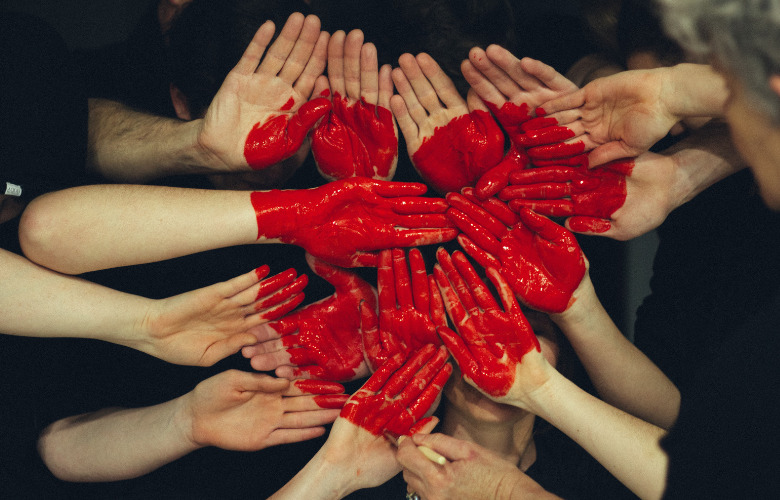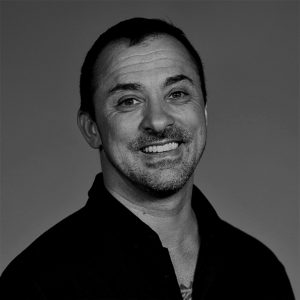
Just recently, a good old friend and work colleague posted a photo on Facebook showing a gender-neutral toilet seen backstage at Cirque du Soleil’s Ka in Las Vegas. As happy as I was about seeing this lovely sight, it also reminded me of how disappointed I continuously am regarding the – in my opinion – very poor efforts made by the entertainment industry towards diversity and inclusion.
As a transgender person, I’ve always been appalled by how little is done towards diversity and inclusion in our industry… by the big entertainment corporations worldwide as well as by the smaller companies.
Of course, this is my limited view, so I am grateful for anyone who can send us content to the contrary!
For now, I am speaking based on my 11 years of backstage experience working for larger and smaller international shows until 2020.
Additionally, my observations are based on the testimonials of friends and colleagues who are also working backstage all over the world.
Let me tell you a little about my experiences. With a couple examples. I will not name any names. Yet these things happened in major, large-scale, international shows, run by well-known entertainment corporations.
In one show I worked, I shared the locker room with all the other males of my team. During 4 years, from the creation of our show to when I left, not once was any effort made to install shower curtains.
We only had bare, dirty walls in a cramped space. And this in a show which had apparently cost over 200 million dollars from production to the great opening.
I am a transgender male who looks very much like any regular male. Until I take my clothes off. Then there are major scars on my chest, and I do not have a penis.
As you might imagine, I was incredibly uncomfortable and never dared to take a shower at work. Which led to problems with my team eventually because they thought I was disgusting. And lazy (since I always ran out of the locker room ahead of everyone else so I could shower at home.)
Most of the time, my emotional state ranged from terrified, to anxious, to nervous (on the good days) during the entire time I worked for this show.
I tried to talk to someone about my predicament. This failed. Then I tried switching departments. This failed as well.
The 20 other males on my team were people I never dared getting close to. Most of them were decent guys. But they all had worked on oil rigs before, cruise ships, or they had even been soldiers. It was a profoundly manly man’s world.
My colleagues’ locker room banter was rough, which I found traumatizing. And they had no sensitivity towards the fact that many of their jokes could be potentially hurtful to others.
Everything was very sexual, testosterone driven, misogynist, and homophobic. Faggot jokes and dirty talk about lady boys dominated almost every exchange.
Some of the guys were swinging their dicks around and even comparing sizes. I had never felt so alone before in my entire life.
Mostly, there was no menace. But still, for me this was a hostile environment.
I loved my job and didn’t want to give up. So, I gritted my teeth and stayed. But at what cost. I am still working through the residual trauma now.
One major problem I found in every show I worked for was that there was no ombuds person.
There was no dedicated, neutral, compassionate individual hired by the company that we as employees could fully trust and go to. I didn’t have anywhere to place a complaint, voice my needs, discuss possibilities.
When I was sexually harassed by one of my superiors in one show, I was not the only one. Eventually some of us who were harassed dared to file an official complaint.
There were more than a dozen of us who came forward. Men and women. Cast and crew. Many of us suffered daily through having our necks massaged, our nipples pinched and having to listen to constant, disgusting sexual banter.
The individual who did this even once grabbed me between the legs.
For me, this was doubly traumatizing. Because I have nothing between my legs, which up until that shocking moment he didn’t know.
When we all began to officially complain, everyone in the local management of the company closed their eyes. And those who didn’t soon had to leave. No measures were taken.
Instead, upper management who had extra flown in from abroad to investigate, told each and every one of us, “We have no intentions of letting this person go or taking any action. It’s your responsibility to tell him that he can’t do that.” (I kid you not.)
Repercussions followed fast. The line manager I had complained about heard about the complaint and retaliated by taking responsibility away from me in stages.
There were no gender-neutral bathrooms anywhere in any show I have ever worked for. I hope there are now. At least in some of them. You tell me? Are there, besides the one at Ka?
Then, think about healthcare. Thankfully, I never needed to go to the hospital in all that time. Because I am not sure if my employers would have protected me and made sure that I get the same treatment in the hospital like everyone else.
Due to being anxious and unsure about my safety, I often self-medicated. Not all my jobs were in countries where it is safe to be transgender. Anything could have happened to me.
Also, no entertainment company I ever worked for offered training for their employees concerning diversity and inclusion. And with this I don’t only mean sensitizing people to be respectful and inclusive towards members of the LGBT+ community.
There also needs to be sensitization towards the rights of women and really anything concerning diversity of cultural, racial, and religious backgrounds, sexual orientation, gender identity, etc.
For example, two of the shows I worked for were in Macau, China. Hundreds of us were let lose in a foreign city without our company properly educating us about local customs. A few booklets were handed out on where to find what. But basically, this was the extent of our information.
When a show is resident in a foreign city for such a long time, then more of an effort should be made. For the sake of the local population just as much as for the sake of the cast and crew who are trying to make a home there. It should be a clear case of simply showing mutual respect. And a few training sessions really don’t cost that much.
How about an introduction into the local customs and religion? This can consist of a couple of short mandatory morning-before-rehearsal sessions.
I worked in Macau twice. At first, I really struggled understanding Macanese life around me. After 4 years, I moved somewhere else.
I came back much more prepared a second time 3 years later and, through being better informed, loved every moment of being exposed to the fascinating Macanese/Chinese culture.
The Entertainment Industry prides itself to be a very diverse environment where people from every background, color, and mentality collaborate for the greater good. To rock the stage and present something magical together every night.
But, in reality, just being a colorful environment where most people are open-minded – and trusting in that – isn’t enough.
Assuming nothing needs to be mentioned because we accept everyone anyways, and thus everything will be alright automatically, is a treacherous slope to walk on. And doesn’t reflect our daily backstage reality.
Because there is bias in our industry every day. Favoritism. Nepotism. Racism. Add to this not being sensitized enough to issues of diversity & inclusion. And most of the time not taking the time in our fast-paced industry to actively make a difference.
Not once in my 11 years working backstage have I ever been asked by any company representative or line manager how I feel. If there is anything I need. Never have they sat together with me to brainstorm on how we can make our work environment safer and more inclusive.
People have specific needs. They need to feel safe, understood, and validated.
A work environment can become a traumatizing mine field faster than you can ever imagine.
And no, presenting amazing open-minded plays and shows thematizing diversity & inclusion and human rights does not exempt you from always also doing your best to create a culture with high ethical values backstage.
I have always worked in both worlds. The colorful, creative world of entertainment and the – at first glance – rather dry, not so creative, corporate office world.
However, in my experience, it is in these far less creative office environments where people have a much more creative approach towards a world in which gender is becoming ever more fluid, and globalization is happening on an every-day basis, complete with all the misunderstandings and struggles that naturally arise when different mentalities, races, and cultures meet.
More and more frequently, trainings are put in place in the regular corporate world. SOPs are drafted. A structure is being built to make sure a climate of mutual respect, diversity & inclusion is being created for everyone. Heck. There are even departments dedicated to only these issues.
In the entertainment industry, I am sick and tired of people saying that if you want to make it and don’t want to be viewed as difficult to work with, you just need to be able to manage with what is given, say yes to every job and environment you can wiggle a foot in, adapt, and make the best of it. To slowly, over the years, be one of those people who will get phone calls and will be offered good jobs.
I have become a master of adaptation over the years.
But this is no way to build a career. It is no way to build a company culture.
Awareness is the key word. Sensitivity. Compassion. An environment where each person can feel safe to be themselves.
We need to make time to understand each other, to build an inclusive, healthy environment for all.
Everything else is unsustainable and turns especially us in the entertainment industry – who are creating magic on stage on a daily basis – into instant hypocrites.
As mentioned in the beginning of this article, if you have any examples of a company culture in the entertainment industry where diversity & inclusion is a goal which is actively pursued and implemented on all levels, then please do not hesitate to contact me: liam@theatreartlife.com
Same goes if you have any examples and thoughts on how we all can do better.
I’d love to hear more and possibly even write about your efforts and/or thoughts. We should share our best practices and experiences regarding this subject as much as possible to effect real change throughout the industry.
Storytelling Can Change Lives – Musings of a Transgender Man
ROCU Host ‘Promoting Diversity Within the Industry’ Panel


Liam Klenk was born in Central Europe and has since lived on four continents. Liam has always been engaged in creative pursuits, ranging from photography and graphic design, to writing short stories and poetry, to working in theatre and shows. In 2016, Liam published his first book and memoir, 'Paralian'.
Read Full Profile© 2021 TheatreArtLife. All rights reserved.

Thank you so much for reading, but you have now reached your free article limit for this month.
Our contributors are currently writing more articles for you to enjoy.
To keep reading, all you have to do is become a subscriber and then you can read unlimited articles anytime.
Your investment will help us continue to ignite connections across the globe in live entertainment and build this community for industry professionals.